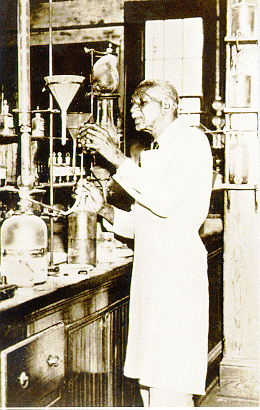George Washington Carver

Few people in history better practiced the idea of thrift by conserving
than George Washington
Carver. His philosophy was "Throw nothing away, everything
can be used again." Throughout his
life he practiced the ethic
of preservation, inventing the science of ersatz, or substitutes. His
profound knowledge
of botany, agriculture, and soil economy enabled him to devise ways of helping
the people of the economically depressed South enhance their mode of living.
Born into slavery, orphaned, and bought for the price of a horse,
Carver conquered overwhelming
odds to secure an education, and ultimately become a
teacher who enriched the minds of thousands
and taught that there
is value in all things. He knew adversity early as a young,
sickly boy with a
serious speech defect. Yet, against staggering poverty,
his perseverance saw him through college
and graduate studies to become
an internationally famous scientist.
Many knew Carver as the "peanut man" because he transformed
this legume into a major
agricultural product, but few recognized his
greater achievements. Besides the 300 products he
developed from peanuts and
118 products from the sweet potato, he developed many new
products from
waste materials, including recycled oil, and paints and stains from clay.

